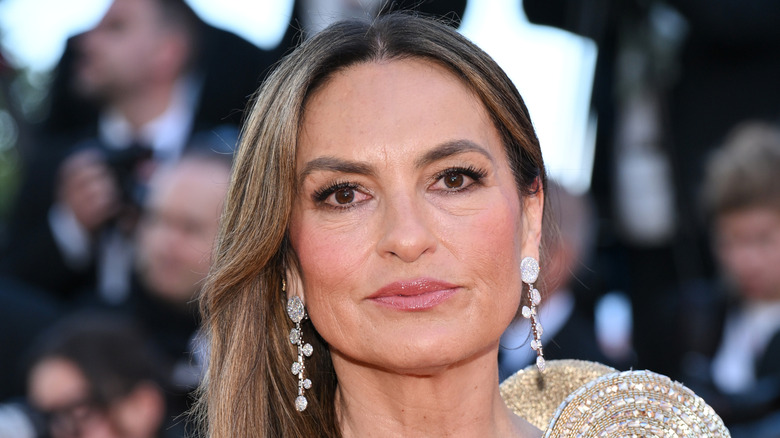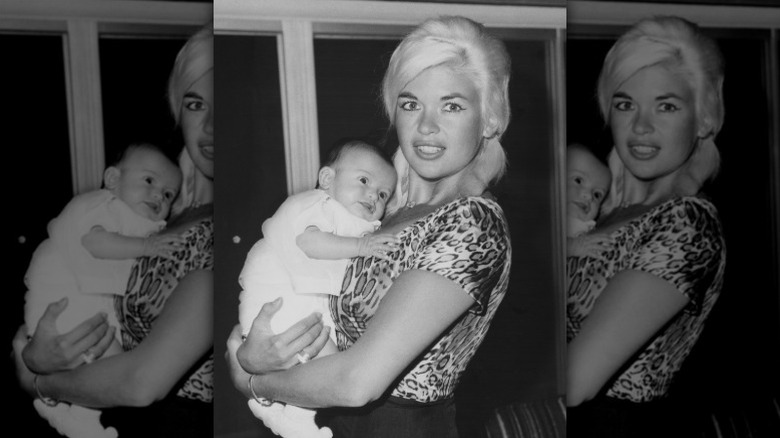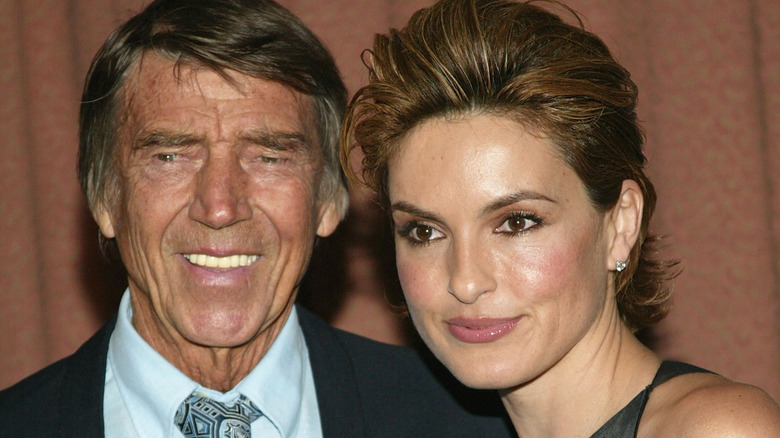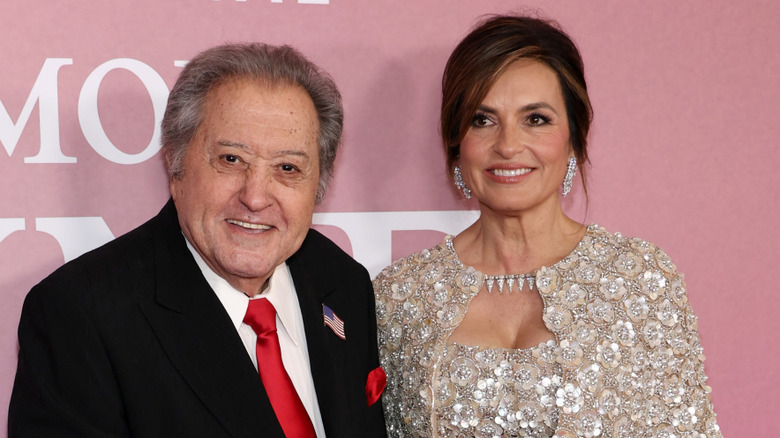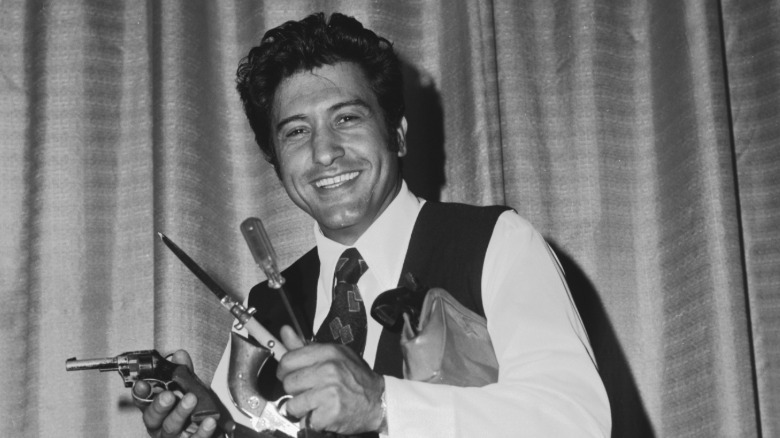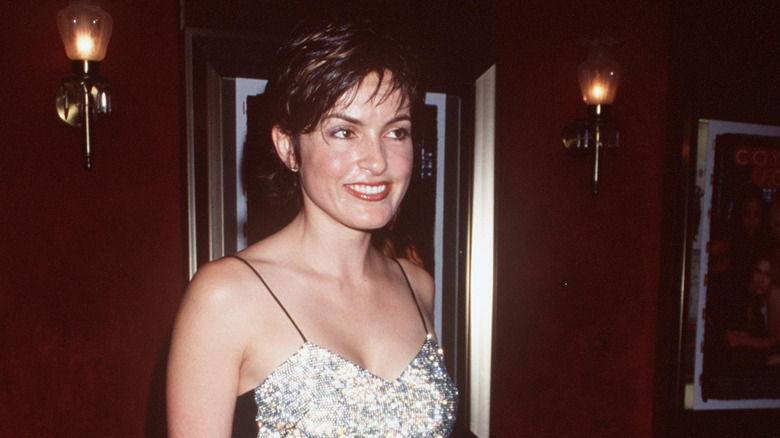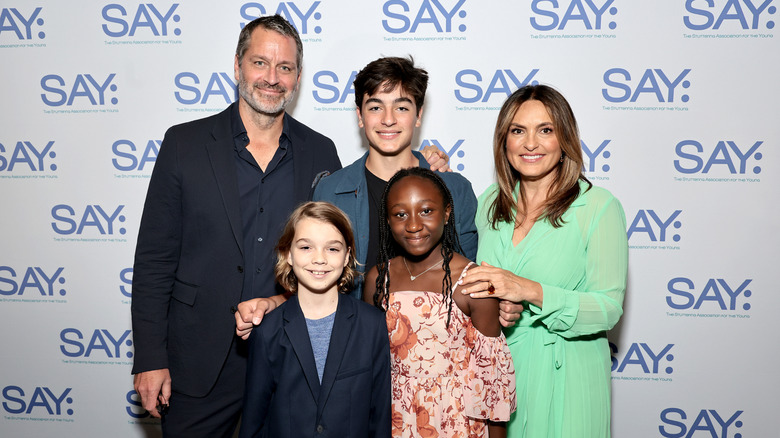The Tragedy Of Mariska Hargitay Gets Sadder & Sadder
The following article discusses sexual violence and rape.
Mariska Hargitay's life was shaped by Jayne Mansfield's legacy, even though she barely knew her. The fourth child of the iconic Hollywood bombshell, the "Law & Order: Special Victims Unit" star lost her mother when she was just a little girl and was subsequently raised by her father — or the man she believed was her father. The complicated truth of Hargitay's famous parents created a tangle of trauma that she spent her life trying to make sense of. In many ways, she has.
Growing up in the shadow of a legendary mother whom she didn't remember, all Hargitay had to go by was Mansfield's public image and her family's recollections. The problem was that those two narratives were utterly incompatible. To the public, Mansfield was a sex symbol, a platinum blonde famous for showing off a cleavage that made Sophia Loren give Hollywood's most famous side-eye. At home, Hargitay heard tales of a smart, talented woman who played the violin and the piano. "My dad would always say, 'She wasn't like that at all. She was like you. She was funny and irreverent and fearless and real," she told Vanity Fair in May 2025.
Unfortunately, it didn't convince her, and she was ashamed of her mother. That began to change many years later during the COVID-19 pandemic. When the world shut down, she looked inward as she wanted to understand Mansfield. In May 2025, Hargitay released "My Mom Jayne," a documentary that marks her reconciliation not only with her mother but with herself. Hargitay had an unusual, trauma-filled life, but she now sees she is where she is supposed to be.
Mariska Hargitay's mother tragically died in front of her
Mariska Hargitay was in the back seat when the car she was traveling in rear-ended a truck near New Orleans at around 2:25 a.m. in June 1967. The then-3-year-old was sleeping next to two older brothers. Jayne Mansfield, her partner Sam Brody, and the chauffeur died at the scene. Mariska, Miklos, and Zoltan Hargitay survived with minor injuries. Because she was so young, she has no clear memories of the accident. "I don't even remember being told that my mother had died," she said in the Vanity Fair piece.
Following Mansfield's death, Mickey Hargitay raised their three children full-time with his third wife, Ellen. Mariska had a close relationship with both and is grateful for the life they gave her, but nothing could fill the hole of the loss of a parent at that age. "I clearly was in that frozen place for a lot of my childhood — of trying to survive, actually trying to survive," she told Glamour in 2021. Her trauma was never addressed.
It wasn't anyone's fault. "I grew up in a house of people dealing with the tragedy in their own way. And because there was so much grief, there wasn't room to prioritize anyone," she said at a 2024 event hosted by Hope For Depression Research Foundation (via People). Her family lacked the proper tools and understanding of trauma to navigate the loss and its consequences. "It wasn't until much later in my life when I was able to do that for myself," she explained.
Mariska Hargitay learned her father's identity as an adult
After Jayne Mansfield's death, Hungarian bodybuilder and actor Mickey Hargitay (seen above) became the most important person in Mariska Hargitay's life. "He was my everything, my idol. He loved me so much, and I knew it," she said in the Vanity Fair interview. "I also knew something else — I just didn't know what I knew." The physical dissimilarities between her, Mickey, and her siblings didn't elude her.
When she was in her 20s, Mariska discovered Mickey wasn't her biological father. In 1963, Mansfield started an affair with Italian-Brazilian singer Nelson Sardelli but reconciled with Mickey when she fell pregnant. "She knew: Mickey will love me forever, and he will love this child," Mariska told Vanity Fair in a separate article. Mariska learned of her father's identity by chance when she saw a photo of Sardelli. "It was like the floor fell out from underneath me," she said in the "My Mom Jayne" preview, pretending to hold up the photo.
She confronted Mickey, who died in 2006, but quickly realized how much distress it caused him. She decided to keep the secret to protect him, but that left her without an outlet to process yet another trauma. "I was so angry at my mother for leaving me in this mess, and for hurting my father, and for leaving me feeling so alone and untethered," she said in the HBO documentary (via BuzzFeed). With time, Mariska understood that they did what they thought was best. "I grew up where I was supposed to," she told Vanity Fair.
Mariska Hargitay initially rejected her biological father
Mariska Hargitay was 30 when she met her biological father. She went to see Nelson Sardelli (seen above) in Atlantic City, but the meeting wasn't the cathartic moment she had hoped. "He looked at me and basically burst into tears, and he grabbed my ear, and he said, 'I've been waiting 30 years for this moment,'" she said in "My Mom Jayne." Her blood boiled thinking of Mickey Hargitay. "I went full Olivia Benson on him," she told Vanity Fair, referring to her famous character. "I was like, 'I don't want anything, I don't need anything from you.... I have a dad.'"
However, they kept in touch and developed a relationship. She learned Nelson hadn't been uninterested in her. In fact, he contacted Mickey to get his opinion. "He said to me, 'Nelson, nobody has to tell me who is the father of my child,'" he recalled in "My Mom Jayne." With time, Mariska understood that Nelson, like her mother and father, had also done what he thought was best for her. "Mickey was the father you knew. And your siblings, they were your siblings. What would I be accomplishing that would be beneficial to you?" he said.
Mariska also became close with his daughters, Giovanna and Pietra Sardelli. In the documentary, Mariska acknowledged the burden they had to carry, not only before she found out but also after. "My need for this, to honor Mickey, was so huge. But the fact is, I was wrong. You guys had to live all these years with this secret," she tells them.
Mariska Hargitay was a victim of sexual assault
The truth about her parentage wasn't the only trauma Mariska Hargitay carried in secret. When she was in her 30s, she became a sexual assault survivor, something she disclosed publicly for the first time in January 2024, in her 60s. "He was a friend. Then he wasn't," she wrote in a personal essay for People. "I tried all the ways I knew to get out of it. I tried to make jokes, to be charming, to set a boundary, to reason, to say no."
When she realized there was no escaping, Hargitay just froze. Then she moved on like nothing had ever happened. "I couldn't process it. I couldn't believe that it happened. That it could happen. So I cut it out," she penned. Now she knows that it's a typical response to trauma, but she didn't back then. Whenever she talked to loved ones about what happened, she minimized it. But the more she talked about it, the more her friends and family opened her eyes to the reality: she had been a victim of rape.
It took years of therapy to come to terms with it. "It wasn't until much later that I found the language to acknowledge it for what it was," she said at the Hope For Depression Research Foundation seminar. Hargitay had been advocating for sexual assault survivors through the Joyful Heart Foundation and as a certified rape counselor years before she accepted she was also one. "I think I also needed to see what healing could look like," she wrote.
If you or anyone you know has been a victim of sexual assault, help is available. Visit the Rape, Abuse & Incest National Network website or contact RAINN's National Helpline at 1-800-656-HOPE (4673).
Mariska Hargitay experienced pregnancy complications
It didn't take long after Mariska Hargitay and Peter Hermann tied the knot to decide they were ready to start their family. A little over a year after the wedding, she got pregnant. They were over the moon. "Nobody wanted to be pregnant more than me," she told Self magazine in 2007 (via People). "From the minute I found out, I was wearing full-on maternity pants. My stomach was totally flat, mind you, but I was just so excited." Things progressed normally until the end of the pregnancy.
In her third trimester, Hargitay was diagnosed with gestational diabetes, a condition that causes high blood sugar and can be harmful to mother and baby. The 54-pound weight gain took a toll on her body. "This pregnancy was really hard for me at the end. I wasn't mobile," she said. In June 2006, she gave birth to a son via emergency c-section. Hermann and Hargitay's son August, who is all grown up now, was 10 pounds, 9 ounces at birth.
That was Hargitay's only pregnancy. When she and Hermann were ready to expand their family, they chose adoption. In April 2011, they adopted Amaya at birth and then adopted a boy, Andrew, just months later. Her unique motherhood journey helped her make peace with her unusual background. "I'm Mickey Hargitay's daughter — that is not a lie," she said in the Vanity Fair story, drawing the similarities to her family structure. "They are my kids. Now I understand so much," she said.

